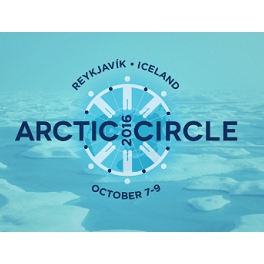
Website: http://arcticcircle.org
Join the conversation on twitter: #ArcticCircle2016
The Arctic Research Consortium of the U.S. (ARCUS) co-organized and participated in two sessions at the 2016 Arctic Circle Assembly. The annual Arctic Circle Assembly has become the largest international gathering on the Arctic, attended by more than 2,000 participants from 50 countries. The Arctic Circle program is available at:
Essential Science for Informed Decision-Making in the Changing Arctic
Date: 7 October 2016
Time: 3:30-5:00 pm GMT
Location: Ríma B, Harpa First Level, Harpa Conference Center
Session Description:
This session was co-convened by ARCUS, the International Arctic Science Committee (IASC), and the Icelandic Centre for Research (RANNÍS). It provided an overview of the key discoveries and emerging questions currently at the forefront of the scientific community's efforts to understand and respond to the changing Arctic environment.
Session speakers guided audience members through current research efforts to understand the Arctic's role in the global weather system, to predict changing sea ice patterns, and to perceive both the global and local implications of thawing permafrost and shifting hydrology patterns in the Arctic's terrestrial cryosphere. By providing a broad scientific overview of the critical dynamics currently shaping the Arctic's natural system, this session served as an important briefing to Arctic Circle Assembly attendees grappling with the many critical governance issues associated with this rapidly changing region.
Session Speakers & Topics:
- Julienne Stroeve – Professor at University College London; Senior Scientist, National Snow and Ice Data Center (NSIDC): The Arctic's changing sea ice
- Margareta Johansson – Executive Secretary, INTERACT; Researcher, Lund University: The Arctic’s changing terrestrial cryosphere
- Thomas Spengler – Professor of Meteorology, University of Bergen: The Arctic’s role in changing global climate and weather
- Andrew Revkin (Moderator) – New York Times Blogger and Pace University Senior Fellow
Session Presentations
 Julienne Stroeve's Presentation (PDF - 14.87 MB)
Julienne Stroeve's Presentation (PDF - 14.87 MB) Thomas Spengler's Presentation (PDF - 13 MB)
Thomas Spengler's Presentation (PDF - 13 MB) Andrew Revkin's Presentation (PDF - 7.04 MB)
Andrew Revkin's Presentation (PDF - 7.04 MB)
Funding support for this event has been provided by the U.S. Arctic Research Commission and the National Science Foundation Division of Polar Programs, Arctic Sciences Section
How to Connect with Arctic Research Across Boundaries
When: 8 October 2016
Where: Háaloft, Harpa Eighth Level, Harpa Conference Center
Time: 2:30-3:30pm GMT
Session Description:
Arctic research spans disciplinary, institutional, national, and sector boundaries in pursuit of improved understanding and decision making for this vital region. In order to work effectively across these boundaries, it is important to focus on effective communication, coordination, and collaboration. This interactive session will explore what is being done, and what could be done, to bridge boundaries and advance research. For example, ARCUS is an international organization that connects across boundaries through the Sea Ice Prediction Network, Study of Environmental Arctic Change (SEARCH), and PolarTREC programs, among others. The session is designed to inform those engaged in research, decision-makers interested in a more effective research enterprise, and others interested in better understanding of the Arctic.
Session Speakers & Topics:
- Robert Rich – Executive Director, ARCUS: Connecting Arctic Research Across Boundaries
- Fran Ulmer – Executive Director, United States Arctic Research Commission: Setting Arctic Research Priorities within the U.S. Government
- Maribeth Murray – Executive Director, Arctic Institute of North America; Professor, University of Calgary: A Binational Organization Advancing Arctic Research
- Volker Rachold – Executive Secretary of the International Arctic Science Committee (IASC): Identifying Priorities for International Arctic Research
- Peter Schmidt Mikkelsen – Lead Coordinator, Arctic Science Partnership (ASP), Isaaffik Arctic Gateway: Connecting Arctic Research, Education, Consultancy and Logistics (within the Kingdom of Denmark)
Session Presentations
